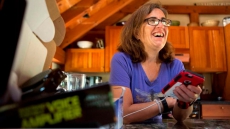VANCOUVER — Technology entrepreneur Tammy Meyers does a mental count every time she attends a business conference promoting the augmented reality company she co-founded. Almost always, she's one of the only women in the room.
Meyers is chief operating officer of QuestUpon, a British Columbia tech firm that's been garnering accolades for virtual tourism experiences similar to the new Pokemon Go craze. She's been watching the province's tech industry advance rapidly, but hasn't seen women prosper at the same rate.
"There's probably more of a hill to climb for women to prove themselves, when it's a male-dominated space," she said.
Meyers blames the imbalance on factors from subtle sexism to lack of women in prominent roles, a view shared by several other female entrepreneurs. They also share a vision for spurring progress equal to the tech boom that's transforming the provincial economy and say their involvement is key to being globally competitive.
An upcoming gathering of 500 female business leaders and another 500 young women will tackle their lagging entry into the exploding tech-driven business world. Organizers of the Vancouver forum "We for She: Championing the Next Generation," have calculated it will take 100 years for women in Canada to achieve parity in the industry at the current rate of advance.
Women make up 54 per cent of B.C.'s post-secondary graduates in science and technology, but hold less than 10 per cent of senior leadership, according to the B.C. Innovation Council.
The forum, taking place in October, will highlight research about the snail's pace of change, said forum co-chair Lois Nahirney. Participants will examine unconscious bias and systemic barriers holding women back from leadership positions.
"It's exhausting, it's like always having to dance backwards in heels," said Nahirney, CEO of dnaPower Inc. and chairwoman of the Premier's Women's Economic Council.

Creating a welcoming environment that doesn't discriminate against hiring women and includes policies supporting life and family balance are vital to improving the dynamic, she said.
Angela Robert, a software engineer who co-founded Conquer Mobile, believes more women will enter the industry if companies allow part-time work, telecommuting and flexible maternity leave.
She said the tech ecosystem hasn't evolved to meet women's needs, nor does it reflect their image.
"Think of the key people who everyone looks up to, Bill Gates and Steve Jobs. How is that appealing to a woman to be like those guys?"
Paris Gaudet is one of only two women in B.C. running a technology organization and she has encountered men "either threatened or challenged" by dealing with her.
"It's a slight word, or subtle body language, or it's something like, 'Paris, are you taking notes?'" said Gaudet, executive director of Nanaimo-based Innovation Island.
But she's heartened that a new generation of women may gain ground thanks to workshops such as Ladies Learning Code and the addition of coding to B.C.'s school curriculum. Gaudet is urging women to band together to establish a tech incubator "for women, about women," to help grow businesses in the sector.
"If we want to kick this thing in the butt, and we want to spark and inspire and revolutionize the way women are leading the tech space, we need to colour outside of the lines," she said.

Several women working at Vancouver tech accelerators, organizations that mentor startup companies, began supporting each other coincidentally and dubbed themselves the "startup sorority."
One core member, Vivian Chan, said she's frustrated that gender is even an issue.
"It's like, 'No, no, no, take a look at what they're doing, not that they're female,'" said Chan, manager of national accelerator operations at WaveFront.
Jessica Pautsch recently lead a successful trade mission promoting her company MeshX, which has developed matchmaking software for surplus food. The firm aims to end global food shortages with a tech-based redistribution system that prevents commercial waste.
Investors are increasingly receptive to her leadership style, she said. Many business cases also support the notion that inclusive, diverse firms with nurturing environments are more successful, she added.
"Higher productivity, the higher the happiness and the higher the bottom line, ultimately."
Women must keep taking risks to enter the industry, but B.C.'s growing tech hub is ripe for progress, said Crop Sense Chief Technology Officer Maryam Antikchi.
"If there is any place in the world where women can accelerate, it would be here."




